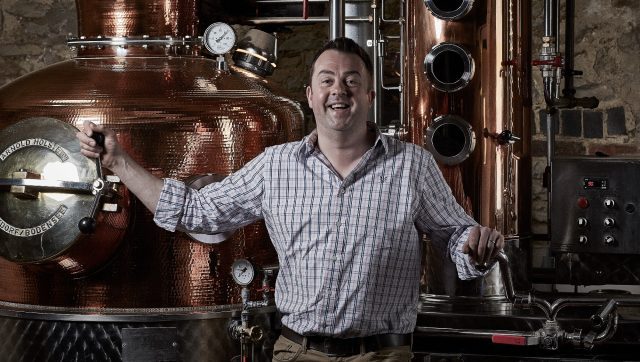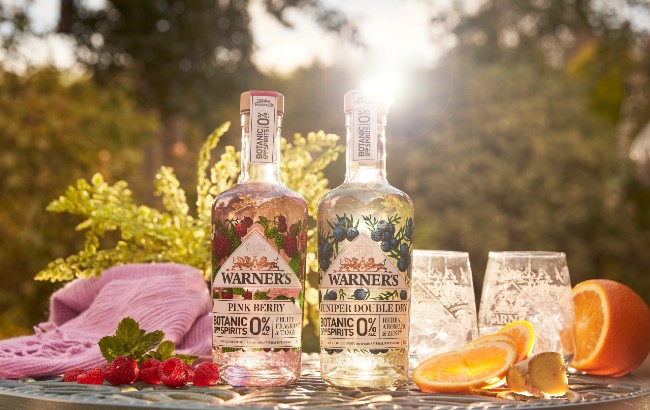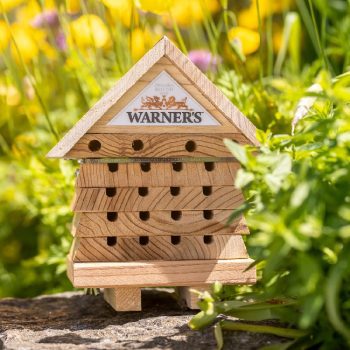This website uses cookies so that we can provide you with the best user experience possible. Cookie information is stored in your browser and performs functions such as recognising you when you return to our website and helping our team to understand which sections of the website you find most interesting and useful.
SB meets… Tom Warner, Warner’s Gin
He turned his dad’s cattle farm into a distillery and brought the ‘first’ rhubarb gin to the UK market. We sat down with Warner’s Gin founder Tom to talk about the brand’s journey so far, and what his plans are for the future.

So you turned your dad’s cattle farm into a gin distillery – when did you first get the inspiration, and how do you think the farm is represented in the liquid you produce?
The journey began in 2009, a farm in the family is a huge responsibility because it doesn’t make a lot of money and it requires constant attention, so it really is a labour of love. To help mitigate this, I diversified the farm to add to the revenue stream. I have always worked in food and drink – farming, coffee buying in east Africa and produce from all over the world were the first 12 years of my career, so any business endeavours had to satisfy that passion. At the time, craft distilling was not prominent in the UK so this evolution of several ideas that led to gin. The penultimate idea we looked at was essential oil production, growing and harvesting oils from botanicals. However, the evolution of that idea ended in gin production.
We have evolved so much since launching in 2012. At the time, independently produced gin was unusual and we brought in all our ingredients but as we have grown and matured, our niche in the category has been directed by our surroundings. Our gut has been our guide and nature has been at the heart.
We are based on a farm in the rolling hills of Northamptonshire and call ourselves ‘the spirit of the British countryside’. We try to grow as many ingredients as we can at the farm and are now self-sufficient in many of the ingredients we use. Through gas chromatography we have established they hold higher concentrations of essential oils too, so we know homegrown not only makes the best tasting liquid, but it also sequesters carbon, and supports biodiversity. This means our gins have the terroir of the countryside around us with field-to-bottle flavours.
It also means, despite how popular it is, we won’t be doing a Pink Grapefruit gin anytime soon, as everything must be found in the British countryside and natural. When we say natural, we don’t mean natural flavourings either, that’s still simplified flavour compounds from a factory. We mean fruit, juice or blossom. So, when you have a glass of Warner’s Gin, you are really tasting the British countryside.
You’ve launched two 0% ABV products – why did you decide to enter the low-and-no space and how have your products been received?
Our liquids have the same love and care as a home-cooked meal – that’s the pride and passion that goes into every bottle. We want everyone to enjoy our passion and craft, so entering the 0% market was a no-brainer for us. It’s about expanding the ritual and quality of a spirit drink and making it available to the non-alc consumer, enabling them to share the experience and not compromise on quality.
If you do it right, it is difficult to make but I worry that there is a lot of poorly made product in the category already, that could turn consumers off.
The exciting thing is that our 0% spirits are the fastest growing part of our business with the suite performing strongly in M&S and having just launched in Waitrose.

You’ve just helped shoot the ‘world’s first’ wildlife documentary in a pub garden – what’s the story behind that?
We shot the documentary to support the launch of Warner’s Nature Marque, which is a first-of-its-kind accreditation for pubs that have taken steps to make their outdoor spaces welcoming for nature.
The idea of the mini-series wildlife documentary is to raise awareness that nature can thrive amongst us, even in the most unexpected places. We all love to sit in a nice pub garden but we aren’t always aware of the benefit that outdoor space can be having for nature and the future of our planet.

It is well documented that British nature needs urgent help, with populations of many wildlife species reaching record lows. The UK is documented as one of the world’s most nature-depleted countries, with nearly half our wildlife lost in the last century.
We need to start putting people and the planet before profit and make the changes we want to see in the world. Mother nature created our brand, we owe everything to her bounty as a business but also as a living being – there is no business without nature!
Beyond the wildlife documentary, we employ environmentalist Jonny Easter, as our conservation and sustainability manager, we are 1% for the planet members (and have been since 2020) and we have secured B Corp certification. Last year we decided to align our vision to the cause we all wanted to fight for and we now have the vision to become the most nature-positive drinks business in the world. When you put that as your north star, it gives you a real focus. Warner’s Nature Marque is one of the ways we contribute towards this vision, making pub gardens nature-positive spaces that help nature while making a nicer drinking environment for consumers and in turn, boosting revenue for the landlord.
What’s the one thing you think every spirits brand should do to increase their sustainability efforts?
Put an environmental just cause at the centre of its vision. This will act as a lens for all business decisions. Materials you allow in business, ingredients used, where things are sourced from, the types of energy consumed. It will drive real change.
What do you think it will take to keep gin on the pedestal it’s been on for the last decade? Where do you see the gin category going from here?
Some of the commentary is frustrating at the moment for gin, lots of people are talking it down and there is a lot of dubious data interpretation going on comparing lockdown periods to non-lockdown periods. We won’t have a true comparison, in my opinion, until about June 2023 when we can see real like-for-like annualisation without the full Covid impact.
That being said, the category can’t continue to grow as it has been forever and consumers can’t manage the number of brands available. This means sector growth has slowed and consolidation is happening, so it’s now a share game rather than a rising tide that lifted everyone. This plays into the hands of the big boys with big budgets and portfolio strength.
It’s already started but the category will have a tumultuous 12 months as retailers rationalise, stocks unwind and a leaner category emerges. Those that make it through will still be playing in a very exciting, vibrant category. What keeps our gin on a pedestal is quality, versatility and provenance. Some of the greatest flavours, quality and environmental steps forwards have been driven by the craft and as spirits continue to become more premium, the category will continue to remain interesting and vibrant for consumers.
Yesterday (24 November), the Asia gin masters results were released by the drinks business.

